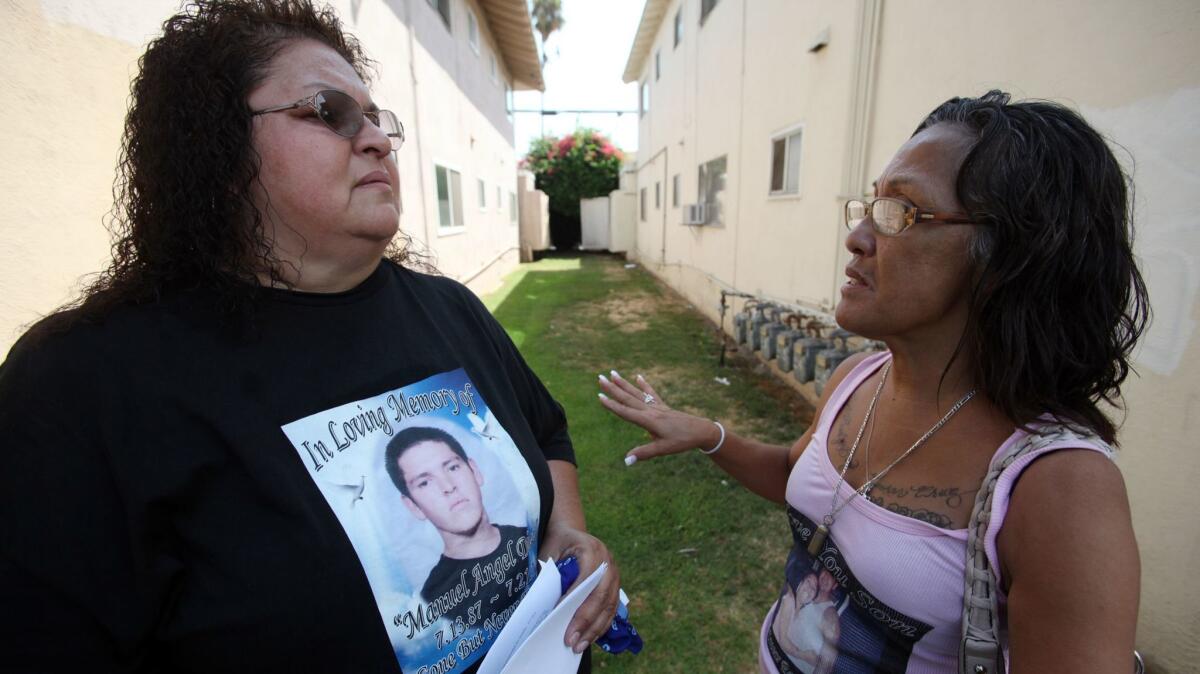Anaheim officer who shot and killed fleeing 25-year-old used excessive force, jury finds

An Anaheim police officer used excessive force when he gunned down a 25-year-old man who was running away from him in an apartment building courtyard in 2012, a federal jury decided Thursday in the trial of a lawsuit filed against the city and the officer by the man’s family.
Jurors hearing the trial of the civil lawsuit will now be asked to determine how much in damages should be awarded to the family of Manuel Angel Diaz.
The Orange County District Attorney’s Office prosecutors cleared Officer Nick Bennallack of any criminal wrongdoing in the July 21, 2012, fatal shooting of Diaz. One day after the shooting, another Anaheim police officer fatally shot 21-year-old Joel Acevedo at the end of a stolen-car pursuit, touching off several days of demonstrations alleging excessive force by police. Some of the protests turned violent.
“We believe the evidence shows the force was excessive and it wasn’t necessary to shoot and kill him,” attorney Dale Galipo, who is representing Diaz’s family, told jurors during his closing argument.
Galipo said what made the case “unique” was Bennallack and his partner, Officer Brett Heitmann, were not responding to a specific service call when they spotted Diaz standing outside a car in an alley near 700 North Anna Drive.
“They don’t see any specific criminal activity,” Galipo said.
Diaz, however, started running when he saw police. The officers shouted to him to stop, but he kept going into a courtyard, where he was gunned down before reaching a fence.
The entire encounter took about 10 seconds.
Bennallack testified he was concerned Diaz had a gun because his hands appeared to be near his waistband.
“He’s using both hands in a location where a weapon is typically kept,” Bennallack said.
Also, just before he opened fire, Bennallack noticed Diaz was not “pumping his arms” as if he were trying to get away and was “looking back” as if he were sizing him up, the officer testified.
“He didn’t appear to be looking for the path of least resistance to escape me,” Bennallack said. “I think he could have easily escaped on foot.”
The officer also testified that the suspect appeared to have an object in his hand that he believed may have been a gun. Bennallack said Diaz, with his back to him, was assuming a “low ready position” to quickly turn and open fire.
Bennallack said his decision to open fire twice was because of an “accumulation of many things.”
“I thought he would shoot me and my partner,” Bennallack testified.
Galipo argued there was testimony that Diaz had a glass pipe, a cellphone and a cloth bag with something in it at various times during the seconds-long pursuit.
“How many objects can Mr. Diaz have in his hand? Is he a circus juggler?” Galipo said.
And, Galipo asked, if Diaz were slowing down to confront the officers, how did he manage to keep a 10-foot distance ahead of the officers?
Galipo also doubted speculation that the black cloth bag contained a gun that someone else took away from the scene.
Three teenage witnesses testified Diaz was shot twice — in the back and in the back of his head — with a pause between shots, Galipo said.
Galipo argued that the officers had to see a gun or fear there was an “imminent threat” of danger to them before opening fire and that wasn’t the case in this instance.
The officers also did not warn Diaz they would shoot if he did not stop, Galipo said. It appeared Diaz could have been surrendering when he was shot, the attorney argued.
Attorney Steven Rothans, who represents the city in the trial, said the officers were in a high-crime neighborhood and that Diaz appeared to be clad like a gang member when they officers tried to approach him.
“These were Boy Scouts hanging out. They were talking about a merit badge,” Rothans said sarcastically. “That’s what Mr. Galipo would like you to believe.”
Bennallack has been involved in three deadly officer-involved shootings since January 2012.
Diaz’s mother, Genevieve Huizar, lost her first bid to hold the city liable for her son’s shooting in a 2014 trial, but the 9th U.S. Circuit Court of Appeals overturned the verdict, ruling that Diaz’s gang affiliation was wrongly included in evidence.
More to Read
Sign up for Essential California
The most important California stories and recommendations in your inbox every morning.
You may occasionally receive promotional content from the Los Angeles Times.








